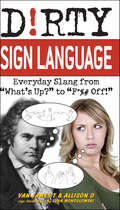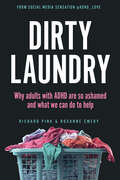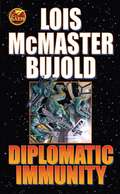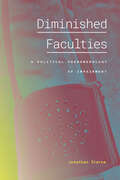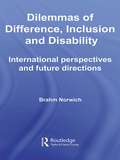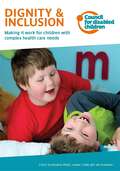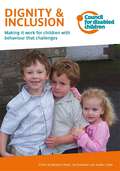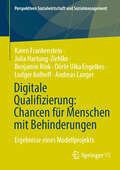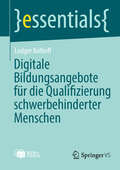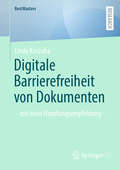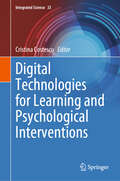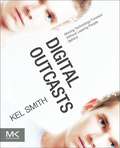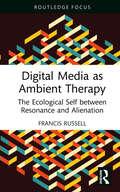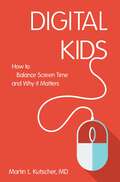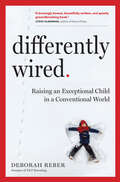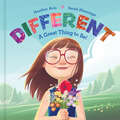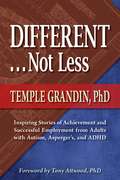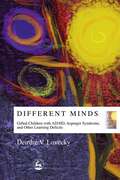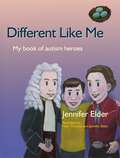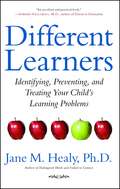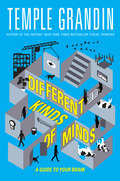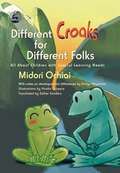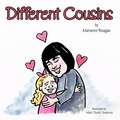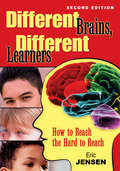- Table View
- List View
Dirty Sign Language: Everyday Slang from "What's Up?" to "F*%# Off!" (Dirty Everyday Slang Ser.)
by Evan Wondolowki Allison O Van James TGET D!RTY!Next time you're signing with your friends, drop the ASL textbook formality and start flashing the signs they don't teach in any classroom, including: cool slang funny insults explicit sex terms raw swear wordsDirty Sign Language teaches casual everyday words and expressions like: Peace out! Asshole. Bit me! Dumbfuck! Boner I'm hung like a horse.
Dirty Laundry: Why Adults with ADHD Are So Ashamed and What We Can Do to Help
by Richard Pink Roxanne EmeryAn empowering and witty guide to banishing shame and living your fullest life with ADHD—plus tips for loved ones on helping them navigate this world, too—from viral duo ADHD_Love. What if you stopped feeling ashamed of constantly being late or of getting so hyperfocused on a task that you drop everything else you had to do? How can you as a partner, parent, or friend better understand your neurodivergent loved one&’s way of moving through the world? In Dirty Laundry, life partners Rich Pink and Rox Emery unapologetically guide you through the ups and downs of life with ADHD. Every chapter starts with a common symptom of ADHD, like impulsivity or struggles with finances, and an earnest moment from their own lives to show you how they navigate the symptom together. Rox reminds you to be kind to yourself and love yourself for who you are; Rich offers tips on how he uses compassion and honesty instead of jumping to conclusions. Whether it's helping your ADHDer with friendly time-checks before an appointment or reminding yourself to take breaks during hours spent hyperfocusing on a new project, Rox and Rich give you the tools to destigmatize and normalize life with ADHD.
Diplomatic Immunity (Miles Vorkosigan #12)
by Lois Mcmaster BujoldMs. Bujold links two of her story lines in this work. Emperor Gregor dispatches Miles Vorkosigan to deal with a diplomatic crisis on Graf Station, home of the Quaddies.
Diminished Faculties: A Political Phenomenology of Impairment
by Jonathan SterneIn Diminished Faculties Jonathan Sterne offers a sweeping cultural study and theorization of impairment. Drawing on his personal history with thyroid cancer and a paralyzed vocal cord, Sterne undertakes a political phenomenology of impairment in which experience is understood from the standpoint of a subject that is not fully able to account for itself. He conceives of impairment as a fundamental dimension of human experience, examining it as both political and physical. While some impairments are enshrined as normal in international standards, others are treated as causes or effects of illness or disability. Alongside his fractured account of experience, Sterne provides a tour of alternative vocal technologies and practices; a study of “normal” hearing loss as a cultural practice rather than a medical problem; and an intertwined history and phenomenology of fatigue that follows the concept as it careens from people to materials science to industrial management to spoons. Sterne demonstrates how impairment is a problem, opportunity, and occasion for approaching larger questions about disability, subjectivity, power, technology, and experience in new ways. Diminished Faculties ends with a practical user’s guide to impairment theory.
Dimensions of Ethical Decision-Making: A Guided Exploration for Interpreters
by Kellie Mills Stewart Anna Witter-MerithewProvides a guided exploration of the dimensions that impact ethical decision-making and engages interpreters in a variety of discussions and activities designed to foster greater degrees of ethical fitness. Fosters a collegial investigation of ethics and ethical decision-making as the cornerstone of effective autonomous practice.
Dilemmas of Difference, Inclusion and Disability: International Perspectives and Future Directions
by Brahm Norwich**Shortlisted for the nasen Special Educational Needs Academic Book award 2008** Inclusion has become very influential internationally in the field of schooling. This has involved the introduction of policies that pursue more provision for, and acceptance of, students with special educational needs or disabilities in ordinary school settings. However, these policies represent different and often conflicting values and approaches to education. The basic dilemma of difference is whether to recognise or not to recognise differences, as either way there are negative implications or risks associated with stigma, devaluation, rejection or denial of relevant opportunities. This is the first book to examine ideas about these dilemmas from a range of disciplines and fields about the nature and origins of such dilemmas as they apply to special and inclusive education. In particular these dilemmas are about: identification – whether to identify students as having special educational needs / disabilities or not? curriculum – how much of a common curriculum is relevant to these students? placement – can appropriate learning can take place in ordinary schools and classes or not? This ground-breaking book examines professional educators and administrators at national and local authority level across three countries – England, USA and the Netherlands – and questions how they recognise tensions or dilemmas in responding to student differences. Of interest to researchers, students, academics and professionals, this study will provide a much needed, balanced and powerful contribution to the inclusion debate.
Dignity & Inclusion: Making it work for children with complex health care needs
by Amanda Allard Jan Delamore Jeanne CarlinThis publication will help all service providers to ensure that disabled children and young people with additional support needs can access services and lead a life as part of their local community, focusing on children who require clinical procedures, children who require moving and handling and children who need intimate care as part of their personal support. Drawing on and including examples of good practice from across the country, Making it work for children with complex health care needs illustrates the ways in which all agencies can work together to develop local policies and procedures to ensure that the needs of this group of children are met in a coordinated and child-centred way. Making it work for children with complex health care needs is one of two companion publications detailing good practice in both inclusive and specialist settings across education, health, social care and leisure.
Dignity & Inclusion: Making it work for children with behaviour that challenges
by Amanda Allard Jan Delamore Jeanne CarlinThis publication will help all service providers to ensure that disabled children and young people with additional support needs can access services and lead a life as part of their local community, focusing on children who have behaviour that challenges as a result of either a severe learning disability and/or autism. Drawing on and including examples of good practice from across the country, Making it work for children with behaviour that challenges illustrates the ways in which all agencies can work together to develop local policies and procedures to ensure that the needs of this group of children are met in a coordinated and child-centred way. Making it work for children with behaviour that challenges is one of two companion publications detailing good practice in both inclusive and specialist settings across education, health, social care and leisure.
Digitale Qualifizierung: Ergebnisse eines Modellprojekts (Perspektiven Sozialwirtschaft und Sozialmanagement)
by Andreas Langer Ludger Kolhoff Julia Hartung-Ziehlke Karen Frankenstein Benjamin Rink Dörte Ulka EngelkesDigitale Bildungsangebote können für Menschen mit Behinderungen eine entscheidende Rolle spielen, um grundlegende berufliche Kompetenzen zu erwerben. Das Modellprojekt "diBa" hat sich intensiv mit dieser Thematik befasst. Es konzentrierte sich auf die Entwicklung und Implementierung digitaler Bildungsangebote, die speziell auf die Bedürfnisse von Menschen mit Behinderungen zugeschnitten sind.
Digitale Bildungsangebote für die Qualifizierung schwerbehinderter Menschen (essentials)
by Ludger KolhoffDigitale Bildung für schwerbehinderte Menschen bietet neue Chancen zur Erweiterung beruflicher Qualifikationen und zur Stärkung der Teilhabe am Arbeitsmarkt. Doch wie lassen sich digitale Bildungsangebote in Einrichtungen der Behindertenhilfe erfolgreich umsetzen? Welche Herausforderungen gibt es, und welche Lösungen ermöglichen eine gleichberechtigte Nutzung?Dieses Buch stellt praxisnahe Konzepte, wissenschaftliche Erkenntnisse und konkrete Handlungsempfehlungen vor, die auf einem Modellprojekt basieren. Dabei werden die Perspektiven von Behindertenhilfe, Arbeitgebern und Betroffenen berücksichtigt. Zusätzlich erhalten Leser*innen Zugang zu einem ergänzenden Online-Kurs.
Digitale Barrierefreiheit von Dokumenten: – mit einer Handlungsempfehlung – (BestMasters)
by Linda KaszubaIn einer zunehmend digitalen Welt ist Barrierefreiheit unerlässlich, um die gesellschaftliche Teilhabe für alle Menschen zu gewährleisten. Dieses Buch beleuchtet die rechtlichen Anforderungen und technischen Standards, insbesondere die Europäische Norm (EN) 301 549, für die barrierefreie Gestaltung digitaler Dokumente. Mit einer konkreten Handlungsempfehlung bietet die Arbeit eine praxisorientierte Anleitung für alle, die barrierefreie Dokumente erstellen, mit besonderem Fokus auf die rechtliche Kommunikation. Diese Anleitung erleichtert den Einstieg in die Anwendung technologischer Standards und unterstützt die Umsetzung rechtskonformer Barrierefreiheit in digitalen Medien. Abschließend gibt die Arbeit einen Ausblick auf die Chancen und Entwicklungen im Bereich Legal Tech, mit denen die digitale Barrierefreiheit und die Barrierefreiheit durch Legal-Tech-Tools weiter gefördert werden könnten. Diese Publikation richtet sich an alle, die Digitalisierung, Inklusion und rechtliche Compliance in ihrer Praxis vereinen möchten.
Digital Technologies for Learning and Psychological Interventions (Integrated Science #33)
by Cristina CostescuThis book is a comprehensive guide for researchers and professionals in special education and psychology. It delves into the world of technological tools for education and intervention, empowering readers to utilize evidence-based practices. With a focus on enhancing evaluation, intervention, and learning processes for children with special needs, the book’s goal is to overcome obstacles and maximize the use of digital tools in schools. Through captivating insights and real-world applications into emerging technologies like social robots, eye-trackers, and digital applications, this book inspires professionals to embrace innovative approaches. Highlighting the potential of technology in transforming educational experiences for neurodiverse children, it offers a wealth of practical resources and knowledge. This book is an essential resource for researchers and professionals in special education and psychology, educators, psychologists, and anyone eager to leverage technology for children's development and well-being.
Digital Outcasts: Moving Technology Forward Without Leaving People Behind
by Kel SmithThe blind person who tries to make an online purchase. The young girl who cannot speak due to a cognitive disability. The man confined to his home due to permanent injury. The single mother with a long-term illness who struggles to feed her family. With one in seven people worldwide currently living with a disability, the term "outcast" covers numerous scenarios. Digital outcasts rely on technology for everyday services that many people take for granted. However, poorly designed products risk alienating this important (and growing) population. Through a "grass roots" approach to innovation, digital outcasts are gradually taking action to transform their lives and communities. This emerging trend provides exciting learning opportunities for all of us. Citing real-world case studies from healthcare to social science, this book examines the emerging legal and cultural impact of inclusive design. Gain a better understanding of how people with disabilities use technology Discover pitfalls and approaches to help you stay current in your UX practices Anticipate a future in which ambient benefit can be achieved for people of all abilities and backgrounds.
Digital Media as Ambient Therapy: The Ecological Self between Resonance and Alienation (Routledge Studies in New Media and Cyberculture)
by Francis RussellDigital Media as Ambient Therapy explores the ways “mental illness” can emerge from our relationships (with ourselves, others, and the world), to address the concern around what kind of relationality is conducive for “mental health” and what role digital technologies can play in fostering such relationality.Exploring the rise of ambient—that is to say, ubiquitous, surrounding, and environmental—technologies and their impact on our understanding of “mental health,” sanity, and therapy, this book critically examines the work of influential contemporary social theorists such as Hartmut Rosa and investigates case studies that reveal new modes of digitally mediated intimacy and attention, such as ASMR and QAnon. It also poses the question of what “mental health” and “mental illness” mean for subjects increasingly faced with a maddening sense of interconnectedness.This book offers new perspectives for academics and postgraduates interested in critical discussions of alienation, digital technology, and contemporary social theory.
Digital Kids: How to Balance Screen Time, and Why it Matters
by Martin L. Kutscher Natalie RosinFor many children and teens daily Internet use is the norm - but where should we draw the line when it comes to digital media usage? This handy book lays out the essential information needed to understand and prevent excessive Internet use that negatively impacts behaviour, education, family life, and even physical health. Martin L. Kutscher, MD analyses neurological, psychological and educational research and draws on his own experience to show when Internet use stops being a good thing and starts to become excessive. He shows how to spot digital addictions, and offers whole family approaches for limiting the harmful effects of too much screen time, such as helping kids to learn to control their own Internet use. He tackles diverse questions ranging from the effects of laptops in the classroom and reading on a digital screen, to whether violent videogames lead to aggression. The author also explains how ADHD and Autism Spectrum Disorder (ASD) can make you more susceptible to Internet addiction, suggesting practical strategies to suit these specific needs. Discussing both the good and bad aspects of the internet, this book tells you everything you need to know to help children and young people use the internet in a healthy, balanced way.
Differently Wired: Raising an Exceptional Child in a Conventional World
by Deborah ReberToday millions of kids are stuck in a world that doesn't respect, support, or embrace who they really are—these are what Deborah Reber is calling the “differently wired” kids, the one in five children with ADHD, dyslexia, Asperger’s, giftedness, anxiety, sensory processing disorder, and other neurodifferences. Their challenges are many. But for the parents who love them, the challenges are just as hard—struggling to find the right school, the right therapist, the right parenting group while feeling isolated and harboring endless internal doubts about what’s normal, what’s not, and how to handle it all. But now there’s hope. Written by Deborah Reber, a bestselling author and mother in the midst of an eye-opening journey with her son who is twice exceptional (he has ADHD, Asperger’s, and is highly gifted), Differently Wired is a how-to, a manifesto, a book of wise advice, and the best kind of been-there, done-that companion. On the one hand it’s a book of saying NO, and how it’s time to say no to trying to fit your round-peg kid into society’s square holes, no to educational and social systems that don’t respect your child, no to the anxiety and fear that keep parents stuck. And then it’s a book of YES. By offering 18 paradigm shifts—what she calls “tilts”— Reber shows how to change everything. How to “Get Out of Isolation and Connect.” “Stop Fighting Who Your Child Is and Lean In.” “Let Go of What Others Think.” “Create a World Where Your Child Can Feel Secure.” “Find Your People (and Ditch the Rest).” “Help Your Kids Embrace Self-Discovery.” And through these alternative ways of being, discover how to stay open, pay attention, and become an exceptional parent to your exceptional child.
Different--A Great Thing to Be!
by Heather AvisNEW YORK TIMES BESTSELLER • This joyful rhyming book encourages children to value the &“different&” in all people, leading the way to a kinder world in which the differences in all of us are celebrated and embraced.Macy is a girl who&’s a lot like you and me, but she's also quite different, which is a great thing to be. With kindness, grace, and bravery, Macy finds her place in the world, bringing beauty and laughter wherever she goes and leading others to find delight in the unique design of every person.Children are naturally aware of the differences they encounter at school, in their neighborhood, and in other everyday relationships. They just need to be given tools to understand and appreciate what makes us &“different,&” permission to ask questions about it, and eyes to see and celebrate it in themselves as well as in those around them.
Different, Not Less: Inspiring Stories of Achievement and Successful Employment From Adults With Autism, Asperger's, and ADHD
by Temple Grandin Tony Attwood<p>Temple Grandin offers the world yet another great work, an inspiring and informative book that offers both hope and encouragement. <p>In these pages, Temple presents the personal success stories of fourteen unique individuals that illustrate the extraordinary potential of those on the autism spectrum. <p>One of Temple’s primary missions is to help people with autism, Asperger’s Syndrome, and ADHD tap into their hidden abilities. Temple chose these contributors from a wide variety of different skill sets to show how it can be done. Each individual tells their own story in their own words about their lives, relationships, and eventual careers. The contributors also share how they dealt with issues they confronted while growing up, such as bullying, making eye contact, and honing social skills. <p><i>Different...Not Less</i> shows how, with work, each of the contributors: <p> <li>Found invaluable mentors <li>Learned skills necessary for employment when young <li>Became successfully employed <li>Developed self-confidence <li>Faced the challenges of forming and maintaining relationships (and sometimes) Raised families</li> </p>
Different Minds: Gifted Children with AD/HD, Asperger Syndrome, and Other Learning Deficits
by Deirdre V LoveckyThrough recognizing the different levels and kinds of giftedness, this book provides an insight into the challenges and benefits specific to gifted children with attention difficulties. Explaining why certain children are gifted and how giftedness is manifested, each chapter on a specific topic addresses the relevance for children with AD/HD and Asperger Syndrome. Lovecky guides parents and professionals through methods of diagnosis and advises on how best to nurture individual needs, positive behavior and relationships at home and at school. Lovecky explores concepts such as asynchrony and the effects of such `uneven' development on children, using case studies to illustrate emotional, intellectual, creative and social development. She also highlights the inadequate measures currently in place to assist parents and teachers and goes on to clearly define what is required to understand and help these children so that their needs can be met more positively in the future. Different Minds, with its wealth of practical and background information, is essential reading for all those who live or work with gifted children with attention difficulties.
Different Like Me: My Book of Autism Heroes
by Marc Thomas Jennifer ElderDifferent Like Me introduces children aged 8 to 12 years to famous, inspirational figures from the world of science, art, math, literature, philosophy and comedy. Eight-year-old Quinn, a young boy with Asperger's Syndrome, tells young readers about the achievements and characteristics of his autism heroes, from Albert Einstein, Dian Fossey and Wassily Kandinsky to Lewis Carroll, Benjamin Banneker and Julia Bowman Robinson, among others. All excel in different fields, but are united by the fact that they often found it difficult to fit in-just like Quinn. Fully illustrated in colour and written in child-friendly language, this book will be a wonderful resource for children, particularly children with autism, their parents, teachers, carers and siblings.
Different Learners
by Jane M. Healy"My child is having trouble in school. What should I do?" When parents are told that their child is having difficulty in school, they often don't know where to turn for reliable information and advice. They may be confused by conflicting claims of "cures" or may mistakenly think that, because some learning problems are genetically based, they can do nothing to help. Even the terminology of learning disorders is confusing: dyslexia, dyscalculia, ADD, ADHD, autism, Asperger's syndrome, NVLD, executive function disorder--what are all these conditions, how do they differ from one another and, most important, what practical steps should parents and teachers take to remedy the situation? This comprehensive, practical guide to children's learning problems should be the first resource parents and teachers reach for when a child shows signs of difficulty in academic, social, or behavioral learning. Drawing on her decades of experience, educator Jane Healy offers understandable explanations of the various types of learning disorders. She distills the latest scientific research on brains, genes, and learning as she explains how to identify problems--even before they are diagnosed--and how to take appropriate remedial action at home, at school, and in the community. Today's fast-paced, stressed-out culture is hazardous to growing minds, says Healy, and a growing "epidemic" of children's disorders is the result. Different Learners offers a complete program not only for treating the child, but also for making more beneficial lifestyle choices at home and improving teaching techniques at school. It shows parents and caregivers how to prevent some learning difficulties from ever happening in the first place. It explains how to have your child evaluated if necessary, and, if a problem is found, how to evaluate various treatments. Different Learners explains how medications for attention and learning work in the brain and why they should not be the first step in most treatment programs. It shows how schools can actually worsen a child's learning difficulties and how to make sure this doesn't happen to your child. It even offers a program for "brain-cleaning" that will help any child perform better in school. Jane Healy draws on stories of real children to offer sympathetic as well as practical advice for children--and parents--who are struggling in an overstressed environment. She provides reassurance that parents and teachers can have dramatically positive effects on every child's ability to learn.
Different Kinds of Minds: A Guide to Your Brain
by Temple GrandinAlbert Einstein. Steve Jobs. Elon Musk. Katharine Johnson. These geniuses are all visual thinkers. Are you?Do you like puzzles, coding, and taking things apart? Do you write stories, act in plays, slay at Wordle? The things you are good at are clues to how your brain works. Are you good at math? Working with your hands? Are you a neat freak or a big mess?With her knack for making science easy to understand, Temple Grandin explains different types of thinkers: verbal thinkers who are good with language, and visual thinkers who think in pictures and patterns. You will discover all kinds of minds and how we need to work together to create solutions to help solve real-world problems.
Different Croaks for Different Folks: All about Children with Special Learning Needs
by Midori Ochiai Esther Sanders Shinya MiyamotoA little frog churns out question after question to a grownup frog, without giving him time to respond. A brown frog must change to green to avoid being eaten by a snake, but she just cannot bring herself to do it. Bugs in the air distract a young frog so much he cannot eat the only one prepared for him for dinner. Aimed at children with autism and other spectrum disorders, this combination storybook and guide encourages students and caregivers to accept and accommodate difference. Along with six lessons, a summary for children, and notes for parents and caregivers by author Ochiai, who has Asberger's Syndrome and has reared to children on spectrum, educator Shinya Miyamoto provides notes on developmental differences, including individual disorders such as learning disabilities, coordination and language disorders and attention deficit hyperactivity disorder. Annotation ©2007 Book News, Inc. , Portland, OR (booknews. com)
Different Brains, Different Learners: How to Reach the Hard to Reach
by Eric P. JensenGive hard-to-reach students the tools for lifelong success and watch test scores improve! Updated throughout and packed with powerful strategies to help students improve brain function, this second edition presents a concise outline for identifying the symptoms and causes of prevalent impairments such as oppositional disorder, learned helplessness, attention deficit disorder, dyslexia, dyscalculia, depression, auditory processing deficits, and more. The author demonstrates how to effectively guide students with learning difficulties and: Recognize the most common conditions that challenge learners; Accommodate the specific learning needs of students with learning impairments; Minimize disruptions for other students.
